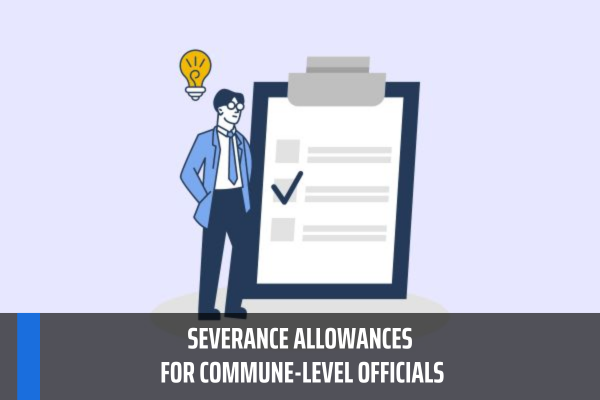How much are the severance allowances for commune-level officials in Vietnam who resign their positions from August 1, 2023?
- What are the regulations on commune-level officials in Vietnam?
- How much are the severance allowances for commune-level officials in Vietnam who resign their positions from August 1, 2023?
- Who are the commune-level officials in Vietnam?
- What are the obligations and rights of commune-level officials in Vietnam?
What are the regulations on commune-level officials in Vietnam?
Pursuant to the provisions of Clause 3, Article 4 of the Law on Cadres and Civil Servants 2008, it is stipulated as follows:
Officials
...
3. Officials of communes, wards and townships (below collectively referred to as commune level) are Vietnamese citizens who are elected to hold posts for a given term of office in People’s Council standing bodies and People’s Committees, as Party secretaries and deputy secretaries, and as heads of socio-political organizations. Commune-level civil servants are Vietnamese citizens who are recruited to hold specialized titles in commune-level People’s Committees, included in the payrolls and salaried from the state budget.
Thus, based on the above regulations, commune-level officials are Vietnamese citizens who are elected to hold posts for a given term of office in People’s Council standing bodies and People’s Committees, as Party secretaries and deputy secretaries, and as heads of socio-political organizations.

How much are the severance allowances for commune-level officials in Vietnam who resign their positions from August 1, 2023?
How much are the severance allowances for commune-level officials in Vietnam who resign their positions from August 1, 2023?
Pursuant to the provisions of Clause 1, Article 27 of Decree 33/2023/ND-CP stipulates as follows:
Resignation as commune-level senior officials and severance of commune-level officials
1. Commune-level officials who resign their positions (except for officials who are reassigned and officials who are disciplined according to regulations of laws on officials) shall be eligible for resignation benefits (for commune-level senior officials) and severance allowances (for commune-level officials) which are calculated according to regulations of the Government on severance allowances for officials.
...
Article 5 of Decree 46/2010/ND-CP stipulates as follows:
Job discontinuation allowance
Officials who discontinue their jobs will be entitled to a job discontinuation allowance as follows: For every working year, the allowance is equal lo 1/2 (half) of their respective current monthly wages, including the wages paid according to salary ranks and grades, position allowance, extra-seniority allowance, professional seniority allowance and wage reservation difference coefficient (if any). The lowest allowance level is equal to their current I (one) month's wage.
Thus, based on the above regulations, commune-level officials in Vietnam who resign their positions, except for officials who are reassigned and officials who are disciplined according to regulations of laws on officials, be eligible for severance allowances as follows:
- For every working year, the allowance is equal lo 1/2 (half) of their respective current monthly wages, including:
+ the wages paid according to salary ranks and grades,
+ position allowance,
+ extra-seniority allowance,
+ professional seniority allowance and wage reservation difference coefficient (if any).
- The lowest allowance level is equal to their current I (one) month's wage.
Who are the commune-level officials in Vietnam?
Pursuant to the provisions of Clause 2, Article 61 of the Law on Cadres and Civil Servants 2008, it is stipulated as follows:
Posts and titles of commune-level officials
1. Commune-level officials defined in Clause 3, Article 4 of this Law include commune-level cadres and commune-level civil servants.
2. Posts of commune-level cadres include:
a/ Party committee secretary and deputy secretary;
b/ People’s Council chairman and vice chairman;
c/ People’s Committee president and vice president;
d/ Vietnam Fatherland Front Committee president;
e/ Ho Chi Minh Communist Youth Union secretary;
f/ Vietnam Women’s Union president;
g/ Vietnam Peasants Association president (applicable to communes, wards and townships with agricultural, forestry, fishery and salt-making activities and Vietnam Peasants Association chapter);
b/ Vietnam Veterans’ Association president
...
Accordingly, posts of commune-level cadres include:
- Party committee secretary and deputy secretary;
- People’s Council chairman and vice chairman;
- People’s Committee president and vice president;
- Vietnam Fatherland Front Committee president;
- Ho Chi Minh Communist Youth Union secretary;
- Vietnam Women’s Union president;
- Vietnam Peasants Association president (applicable to communes, wards and townships with agricultural, forestry, fishery and salt-making activities and Vietnam Peasants Association chapter);
- Vietnam Veterans’ Association president
What are the obligations and rights of commune-level officials in Vietnam?
Pursuant to the provisions of Article 62 of the Law on Cadres and Civil Servants 2008, the obligations and rights of commune-level officials are as follows:
- To perform obligations and exercise rights defined in this Law, other relevant laws and statutes of organizations of which they are members.
- Incumbent commune-level cadres and civil servants are entitled to salary and insurance regimes; when ceasing to hold their posts, if meeting conditions and criteria as prescribed by law, they may be considered for being employed as civil servants, in this case, they are exempt from the probation regime and enjoy regimes and policies without interruption. If they are not employed as civil servants and not eligible for retirement, they may no longer receive salaries and shall pay voluntary insurance premiums under law; if they are transferred, rotated or seconded cadres or civil servants, competent agencies shall provide them with appropriate jobs or entitlements under law.
Accordingly, commune-level officials have the rights and obligations as mentioned above.
LawNet